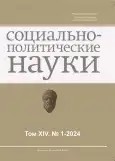Impact of Russia’s elites on the 2024 presidential elections
- Authors: Volokh O.V.1, Alekhin V.S.1
-
Affiliations:
- Omsk Humanitarian Academy
- Issue: Vol 14, No 1 (2024)
- Pages: 13-18
- Section: Political Institutions, Processes and Technologies
- URL: https://journal-vniispk.ru/2223-0092/article/view/255027
- DOI: https://doi.org/10.33693/2223-0092-2024-14-1-13-18
- EDN: https://elibrary.ru/BZOWXH
- ID: 255027
Cite item
Abstract
This article examines the issue of the relationship between the elites of Russia, as well as their possible influence on the course of the election campaign for the election of the President of the Russian Federation. The work analyzes the varying degrees of influence on the formation of approaches in the process of transformation of the Russian political system. The purpose of preparing a scientific article is to study the problems of the influence of significant elite groups on pre-election scenarios, with an assessment of the position of competing political structures during the federal election campaign. In addition, there is speculation about possible steps they will take to acquire more influential positions in the next six months, when preliminary nominations of candidates take place and the prospects for election “battles” are outlined. The conclusions underlying this work make it possible to determine the current state of the elites in their competition in the field of political influence on candidates in the presidential “race”.
Full Text
##article.viewOnOriginalSite##About the authors
Oleg V. Volokh
Omsk Humanitarian Academy
Author for correspondence.
Email: voloh.corpar@mail.ru
ORCID iD: 0009-0008-6707-8685
SPIN-code: 7440-0999
Dr. Sci. (Polit.), Professor; Professor, Department of Economics and Management
Russian Federation, OmskVitalii S. Alekhin
Omsk Humanitarian Academy
Email: vitaly638@gmail.com
postgraduate student, Department of Political Science, Social and Humanitarian Disciplines and Foreign Languages
Russian Federation, OmskReferences
- Grigoriev A.V. Russia in the modern discourse of Polish political elites. Questions of Elitology. 2022. Pp. 29–34. (In Rus.)
- “United Russia” announced its intention to use neural networks in regional campaigns. URL: https://www.rbc.ru/newspaper/2023/04/24/
- Ivanova L.A. Features of the institutionalization of the political elite of modern Russia. Higher Attestation Commission. Sociology. 2019. Pp. 257–265. (In Rus.)
- Ivanova M.I., Zaseeva A.S. Legitimation of the political elite in the philosophy of postmodernism. Society: Politics, Economics, Law. 2023. No. 4. Pp. 31–40. (In Rus.)
- Komarova D.G. Transformation processes in the structure of the Russian political elite. Forum of Young Scientists. 2021. Pp. 196–201. (In Rus.)
- Kadyrov proposed canceling the Russian presidential elections in 2024 because of the North Military District. Kommersant. October 07, 2023. (In Rus.)
- Usova Yu.V. Administrative and political elites of modern Russia in the regional dimension. Questions of Elitology. 2020. Pp. 122–128. (In Rus.)
- List of political parties that have the right, in accordance with Federal Law of July 11, 2001 No. 95-FZ “On Political Parties”, to take part in elections, as of the day of the official publication of the decision to call elections. Rossiyskaya Gazeta. June 15, 2023. (In Rus.)
- Habermas Yu. The problem of legitimation of late capitalism. Moscow: 2010. P. 262.
- Yushkina N.A. Professional elevators to the political elite of Russia. Digital Sociology. 2020. Pp. 25–30. (In Rus.)
- Inglehart R. The silent revolution: Changing values and political styles among western publics. Princeton, 1977. 482 р
- Lasswell H.D. Power and personality. Westport, 1948. 262 p.
- Lipset S.M. Some social requisites of democracy: Economic development and political legitimacy. The American Political Science Review. 1959. Vol. 53. Iss. 1. Pp. 69–105. URL: https://doi.org/10.2307/1951731
- Pareto V. The Rise and Fall of the elites: An application of theoretical sociology. Totowa, 1968. 120 р.
- Sсhaar J. Legitimacy in the modern state. New Brunswick, 1981. 359 р.
Supplementary files








